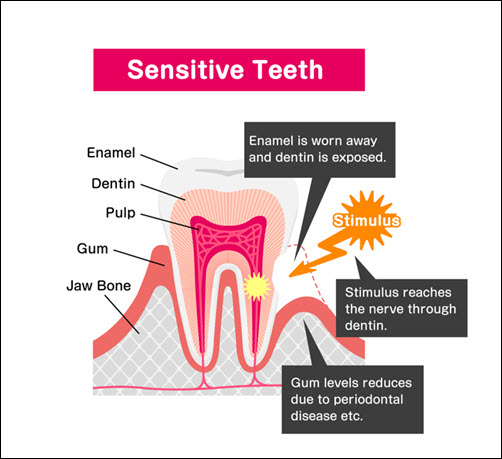How to Care for Sensitive Teeth
Sensitive teeth cause discomfort when eating or drinking hot, cold, or sweet foods. Exposed dentin or weakened enamel increases sensitivity. Gum recession, tooth grinding, and acid erosion worsen sensitivity. Proper care reduces sensitivity and protects tooth strength. Fluoride treatments, desensitizing toothpaste, and proper brushing strengthen enamel and reduce discomfort. Professional dental treatments repair enamel and improve gum attachment. Managing sensitivity increases chewing comfort and bite strength. Understanding how to handle sensitive teeth improves overall dental health. Let’s explore how to reduce sensitivity and protect your smile.

Use Desensitizing Toothpaste to Reduce Sensitivity
Desensitizing toothpaste blocks nerve signals and reduces sensitivity. It contains compounds like potassium nitrate that shield nerve endings. Brushing with desensitizing toothpaste twice daily strengthens enamel and reduces discomfort. Avoid rinsing immediately after brushing to allow the toothpaste to work. Desensitizing toothpaste reduces pain from hot, cold, and sweet foods. It forms a protective barrier over exposed dentin. Fluoride-based toothpaste increases enamel resistance to acid and bacterial damage. Consistent use reduces sensitivity over time and improves chewing comfort. Dentists recommend desensitizing toothpaste for long-term sensitivity relief. Stronger enamel increases tooth durability and reduces sensitivity. Better enamel protection improves overall mouth comfort.
Brush Gently with a Soft-Bristled Toothbrush
Brushing too hard wears down enamel and increases sensitivity. Use a soft-bristled toothbrush to protect enamel and gums. Hold the brush at a 45-degree angle to the gumline. Use small, circular motions to clean all tooth surfaces. Avoid brushing side to side, which increases enamel wear. Brush for at least two minutes to remove plaque effectively. Gentle brushing strengthens enamel and reduces gum irritation. Soft bristles protect exposed dentin and reduce sensitivity. Electric toothbrushes provide consistent pressure and reduce over-brushing. Replacing your toothbrush every three months improves brushing effectiveness. Proper brushing reduces enamel wear and strengthens overall tooth health.
Avoid Acidic and Sugary Foods
Acidic and sugary foods weaken enamel and increase sensitivity. Soda, citrus fruits, and candy soften enamel and expose dentin. Bacteria feed on sugar, producing acids that erode enamel. Drinking water after acidic foods reduces acid exposure. Rinse your mouth with water to balance pH levels. Eating calcium-rich foods like cheese and yogurt strengthens enamel. Crunchy fruits and vegetables increase saliva production and clean tooth surfaces. Reducing acidic and sugary intake increases enamel strength and reduces sensitivity. Better diet choices improve tooth durability and overall mouth comfort. Protecting enamel reduces long-term sensitivity and strengthens tooth health.
Use Fluoride to Strengthen Enamel
Fluoride treatments strengthen enamel and reduce sensitivity. Brushing with fluoride toothpaste increases enamel resistance to acid and bacteria. Professional fluoride treatments provide deep enamel protection and reduce nerve exposure. Fluoride mouthwash seals small cracks and strengthens tooth surfaces. Drinking fluoridated water improves daily enamel protection and increases tooth strength. Dentists recommend fluoride toothpaste with at least 1,000 ppm of fluoride. Fluoride restores lost minerals and increases cavity resistance. Stronger enamel reduces sensitivity and increases chewing comfort. Regular fluoride treatments improve enamel durability and surface smoothness. Better enamel protection increases bite strength and overall mouth comfort.
 Treat Gum Recession to Protect Tooth Roots
Treat Gum Recession to Protect Tooth Roots
Gum recession exposes tooth roots and increases sensitivity. Plaque buildup along the gumline increases gum inflammation and recession. Professional cleanings remove plaque and tartar, improving gum health. Scaling and root planing smooth tooth roots and improve gum attachment. Dentists recommend gum grafting for severe recession. Proper brushing and flossing reduce gum irritation and inflammation. Antibacterial mouthwash reduces plaque and strengthens gum tissue. Wearing a night guard reduces gum pressure from grinding and jaw clenching. Stronger gums improve tooth stability and reduce root exposure. Protecting gum health increases overall dental strength and comfort. Healthy gums reduce sensitivity and increase tooth protection.
Wear a Night Guard to Prevent Grinding
Teeth grinding (bruxism) increases enamel wear and sensitivity. Grinding weakens tooth surfaces and exposes dentin. A custom night guard protects teeth from grinding pressure. Wearing a guard reduces jaw strain and enamel damage. Soft night guards increase comfort and improve bite alignment. Proper fit prevents shifting and increases tooth stability. Night guards protect dental work such as crowns and fillings. Consistent use reduces morning jaw pain and tooth sensitivity. Professional adjustments improve night guard fit and effectiveness. Reduced grinding improves enamel strength and bite comfort. Wearing a guard increases long-term tooth protection and comfort.
Rinse with Saltwater to Reduce Sensitivity
Saltwater rinses reduce inflammation and sensitivity. Dissolve one teaspoon of salt in warm water. Swish the solution around your mouth for 30 seconds. Saltwater reduces gum inflammation and improves tissue healing. Rinsing with saltwater removes bacteria and plaque from hard-to-reach areas. Warm saltwater soothes sore gums and reduces tooth sensitivity. Regular rinsing strengthens gum attachment and increases comfort. Saltwater balances mouth pH levels and reduces acid exposure. Professional dentists recommend saltwater rinses for minor gum inflammation. Reduced inflammation improves overall dental strength and bite comfort. Saltwater rinsing increases gum health and reduces long-term sensitivity.
Schedule Regular Dental Checkups
Professional dental cleanings remove plaque and tartar buildup. Plaque hardens into tartar, increasing sensitivity and enamel wear. Dentists use ultrasonic tools to clean tartar without damaging enamel. Scaling and root planing improve gum attachment and reduce sensitivity. Professional fluoride treatments strengthen enamel and increase surface resistance. Dentists monitor bite alignment and detect early signs of enamel weakness. Early treatment prevents sensitivity and improves chewing comfort. Professional adjustments improve bite strength and enamel durability. Regular cleanings increase enamel strength and protect against plaque formation. Professional care improves long-term dental health and reduces sensitivity.
Avoid Whitening Products and Harsh Toothpaste
Whitening products increase enamel wear and sensitivity. Bleaching agents penetrate enamel and expose dentin. Harsh toothpaste contains abrasives that weaken enamel and increase sensitivity. Use a gentle toothpaste with fluoride to protect enamel. Avoid charcoal and baking soda-based toothpaste, which scratch enamel. Professional whitening treatments use lower-strength agents and increase enamel protection. Dentists recommend desensitizing toothpaste after whitening treatments. Proper brushing and flossing reduce staining and improve tooth color. Avoiding harsh products increases enamel strength and reduces discomfort. Stronger enamel reduces sensitivity and increases chewing comfort. Protecting enamel increases long-term dental strength and comfort.
Boosting Confidence with a Comfortable Smile
Reduced sensitivity increases smile strength and confidence. Stronger enamel improves chewing comfort and bite alignment. Reduced tooth pain increases comfort while eating and drinking. Clean, smooth teeth improve breath freshness and smile appearance. Better enamel strength reduces plaque buildup and gum irritation. Stronger teeth increase confidence in social and professional settings. Reduced sensitivity increases comfort with hot, cold, and sweet foods. Professional care improves long-term enamel durability and gum health. Consistent care increases tooth strength and overall mouth comfort. A balanced, strong smile increases both dental health and personal confidence.
Handling sensitive teeth strengthens enamel and reduces discomfort. Desensitizing toothpaste and fluoride treatments improve tooth durability and nerve protection. Proper brushing and flossing reduce plaque and strengthen gums. Avoiding acidic and sugary foods protects enamel from erosion. Professional care detects early signs of sensitivity and prevents damage. Wearing a night guard reduces grinding pressure and protects enamel. Saltwater rinses reduce inflammation and improve gum strength. Professional dental care strengthens enamel and improves bite comfort. Consistent care increases tooth strength and reduces sensitivity. A strong, healthy smile improves both dental health and personal confidence.













